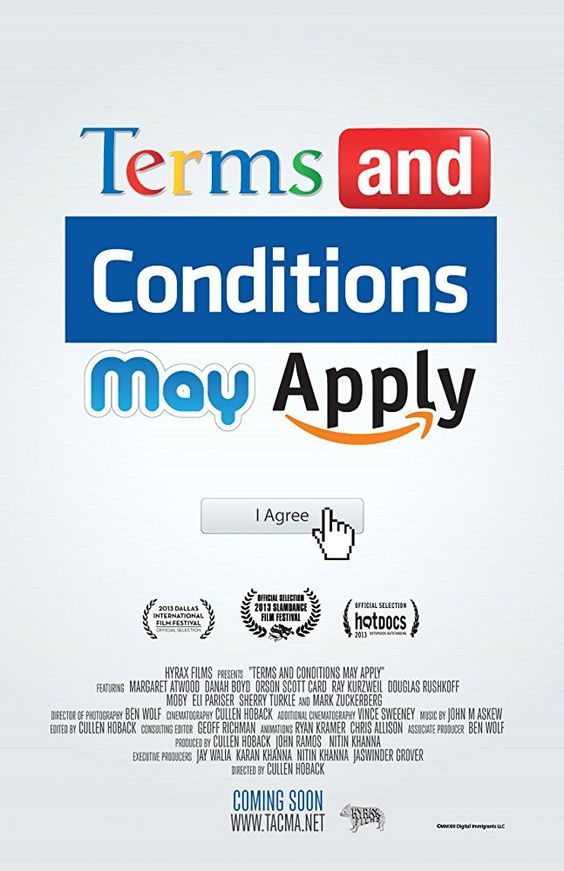
Photo Credit: Terms and Conditions May Apply (2013) documentary visual
“Terms and Conditions May Apply” is probably the most enigmatic phrase that you will encounter when reading the privacy policy of virtually any site. It’s also the name of a Netflix documentary that goes on exposing the truth behind pages upon pages of uninviting text that we usually give a swift scroll, followed by a vacant “I agree” click.
Produced in 2013 by Cullen Hoback, the film is relevant today as online service providers everywhere, starting with the biggest, most popular names, are proving ambiguous practice when collecting users and customers information. Today, we simply expect our data to be used without our knowledge or consent when surfing a website, installing a software or purchasing goods online. It has become so much of a given that keeping track of all privacy policies of all the sites we use on a regular, would consume enormous attention, the grey matter that we are seemingly using less and less while online or at least on definite, short spans.

Photo Credit: pinterest.com
Users and service providers alike are now trying to adjust to the new online environment which is still far from being appropriately regulated. For users, the solution is more in the direction of setting protective measures in place and some of the service providers are trying to limit credibility loss by doing the same. However, most of the so called “protective measures” taken by service providers still sound like liabilities instead.
Take Facebook ‘s new menu item called “Protect” – the blue shield icon that takes you to Onavo, a VPN service owned by the company. Onavo is basically the same piece of machinery as most VPN services out there, but here’s the catch though: it’s owned by Facebook. Without making a point that Onavo is not trustworthy in absolute terms, but simply stating the obvious that in there lies a possible conflict of interest, one that we would not recommend you gamble, it’s probably for the best that you get your VPN service elsewhere.
No longer an exotic tool, VPNs are now entering the mainstream and given the context it’s easy to understand why. There are tons of VPN providers, but one should probably be aware of their business affiliation. The painless solution here is to go with an independent provider, free from such affiliation and/or partnerships.
And as we already know by now, it’s not just Facebook that keeps track of your browsing data, it’s your cell phone provider too, most apps, operating systems, and other services do the same. Smartphones with preinstalled tracking software, secretly bundled with tracking files are sold everyday, while some companies try to leverage the very problem they created by charging extra for privacy. Setting yourself with Facebook’s Onavo could not only mean that Facebook is keeping track of your activity when you use the app, but also when you browse away from the social network, stretching the net even further.
Having a VPN in place is the smart approach to getting around all this. Think at a VPN as the middleman between you and the internet, where your ISP can only see a bunch of encrypted traffic. And since your VPN knows as much as your ISP would, it’s very important to choose a reliable one with a zero log policy and a strong encryption. These 2 benefits are not in the cards for Onavo, which has a very slippery way to explain the way it stores user’s information in the following:
“We may use the information we receive to provide, analyze, improve, and develop new and innovative services for users, Affiliates and third parties.” Customer information is also stored according to “applicable laws and assist law enforcement.” which is not exactly music to our ears, considering net neutrality recent repeal. Services like MyIP.io offer privacy focused VPNs and can not store personal information of their users by design. Engineered as a global platform,MyIP.io is a VPN service provider committed to developing applications and services that preserve an open and secure Internet experience while respecting user privacy.
On the other hand, Onavo’s statements on data collection are far from being focused on user’s privacy unequivocally: “The app may collect your mobile data traffic to help us recognize tactics that bad actors use. Over time, this helps the tool work better for you and others. We let people know about this activity and other ways that Onavo uses and analyses data before they download it.”
All in all, online data privacy has never been more present on the public agenda than in the past few months, when news about Facebook data misuse broke as the Cambridge Analytica scandal unfolded. Whether the scandal is purely political, having the can-not-be-ignored Trumpian element attached to it, or the billion dollar pixel empireof Sillicon Valley ( as Wired describes it), there is a certain collateral that goes much deeper than politics or the Valley. And that collateral element is how easy we ourselves give away personal data in our idealized, highly curated virtual identities we create.
Stepping aside from the Facebook scapegoat, since we all know it’s not just Facebook that allows public data collection, but many more, let’s think about the positives in the wake of recent events. We are now more aware than ever before about the consequences of our online activity and how easy that data can be manipulated if given the chance. It’s time we should all be more responsible about our online footprint and take ownership of our data, take charge of our own protection. In all of the above, the no brainer is to set ourselfs up with a VPN service, one that is reliable and free from aforementioned affiliation.
Using their users as servers by converting them into a botnet, some VPN providers have been revealed, while others admit in their lawyer-eese terms of service, they can sell your bandwidth to other companies.
In other words, by searching a bargain you can be faced with two main issues:
- Slower computer and internet connection: as you’re sharing your bandwidth and processor with others;
- Higher Security Risks: assuming responsibility for what other users do online, that can be tracked down back to your IP.
A good VPN will have its own servers and encryption protocols designed for it, reducing possible security failures to a minimum. Free VPN services are often an open door to malware and can be easily used by scammers.
In the FREE vs. PAID matter, its is important to understand that most legit businesses will offer 7 days of free trial, but a free connection on a indefinite period of time is sure to get its profit elsewhere; in ways that can harm your security and defeat the whole purpose of having a VPN in the first place.
We suggest you do yourself a favor and invest a good 5 bucks for a reliable VPN like the dedicated VPN you can get from My IP.io or from another reliable provider.

